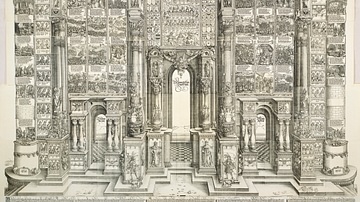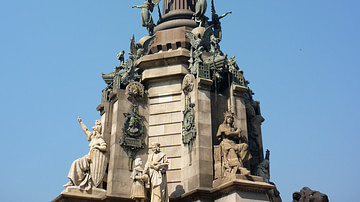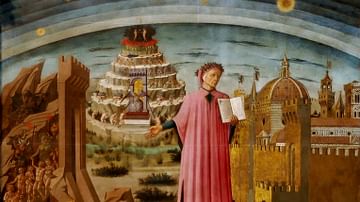Search Images
Browse Content (p. 815)

Image
Marble Head of a Philosopher
1st- or 2nd-century CE Roman copy of a Greek statue of the last quarter of the 3rd century BCE.
There are striking similarities between this head and portraits of Aristotle (384–322 BCE), but the identity of this man remains unknown.

Image
Triumphal Arch of Maximilian by Dürer
The Triumphant Arch of Maximilian is a composite print made from 192 woodblock printed pieces. The work was commissioned by Maximilian I, Holy Roman Emperor (r. 1508-1519 CE) and carried out c. 1515 CE by various artists supervised by Albrecht...

Image
Albrecht Dürer Self-portrait
An oil-on-wood panel self-portrait by the German Renaissance artist Albrecht Dürer (1471-1528 CE). Painted c. 1500 when the artist was 28, this portrait shows Dürer's mastery of natural realism - indeed, his dog was impressed, it is said...

Image
Stupa at Piprahwa
Brick stupa at Piprahwa, discovered by William Claxton Peppe in the late 19th century CE. The stupa and other artifacts on site strongly suggested that Piprahwa was ancient Kapilavastu. However, the other possiblity, Tilaurakot was not dismissed...

Image
Tilaurakot
The east gate of King Suddhodana's Palace at Tilaurakot archaeological site in Taulihawa, Kapilvastu District, Nepal.

Image
Dante and Virgil in Hell by Delacroix
An 1822 CE painting by Eugène Delacroix showing Dante and Virgil in Hell, a scene from Dante Alighieri's Divine Comedy, c. 1319 CE. (Louvre, Paris)

Image
Columbus Monument
Colombus Monument, Barcelona

Image
15-century CE Nautical Map
Nautical chart of the North-East Atlantic Ocean, the Baltic Sea, the Mediterranean Sea and the Black Sea, accompanied by a circular world map.
Alleged author: Cristopher Columbus (l. 1451-1506 CE)
Gallica Digital Library

Image
Columbus' Arrival in America
Mosaic at the Metro Station Avenida de America, Madrid, representing the discovery of the New World by Christopher Columbus (l. 1451-1506 CE).

Image
Dante by Domenico di Michelino
Dante Alighieri by Domenico di Michelino. The scene, painted in 1465 CE, shows the poet in front of the mountain of Purgatory as described in his Divine Comedy, a copy of which he is holding. The cathedral of Florence can also be seen on...